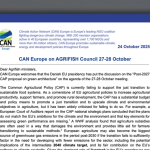|
Brussels, 8 November 2024 – As the world grapples with the repercussions of a year marked by unprecedented climate events, the international community now turns its gaze towards the United Nations conference in Baku. Against the backdrop of record-breaking global temperatures and extreme weather worldwide, the urgency of tackling the climate crisis is more pressing than ever. In Baku, the EU must step up action to address the global climate emergency and further build on climate commitments that have been made throughout the Commissioner confirmation hearings this past week. Despite the results of the US elections, the scientific and moral imperative to address global emissions and build climate resilience remains. Expectations are therefore high on the EU to play an active role to help reach an agreement for a new financial goal that truly moves resources from the rich countries, to the most climate vulnerable countries, particularly in the global south.
CAN Europe’s Key Demands for COP29Pay Up: The EU and developed countries must pay up and end financial injustice: The EU must be vocal in the discussions to mobilise trillions to support frontline communities facing the climate crisis. This includes committing to a more ambitious post-2025 New Collective Quantified Goal (NCQG) that channels at least $1 trillion in public grants to developing nations. It is time to tax fossil fuel giants and to stop the hypocrisy of looking to the future, while continuing to perpetuate the very systems that caused the crisis. ‘We must provide the necessary means for developing countries to actually implement their climate plans and cope with unavoidable climate impacts’ said Emilia Runeberg, Climate and Development Policy Officer at CAN Europe. ‘Developed countries are looking to the private sector to come to the rescue of developing countries grappling with escalating climate impacts. But we learnt from the 2009 climate finance goal that private finance does not find its way to those most in need. This time around, we need a goal for clearly defined public finance provisions’. End Fossil Fuels: The era of fossil fuels has to be ended, once and for all: The EU must champion a global fair, fast, full and funded phase-out of fossil fuels. By committing to a complete phase-out of coal by 2030, fossil gas by 2035, and oil by 2040, the EU can end reliance on damaging fossil fuels and unproven technologies like carbon capture. We urge the EU to cut fossil fuel subsidies by 2025 in a socially just manner and accelerate the transition to a 100% renewable energy system by 2040, with binding targets of at least 50% renewables and 20% energy savings by 2030. The EU should declare these fossil fuel phase-out dates as part of its upcoming Nationally Determined Contributions (NDCs). ‘The EU’s rhetoric on phasing out fossil fuels is encouraging, but simply empty when not matched with financial support for developing countries’ said Chiara Martinelli, Director at CAN Europe. The excessive profits from fossil fuels must be redirected to support climate action in the countries that need it most. Anything less perpetuates global inequality and climate injustice.’ Human Rights, equity and safe operating space for civil society have to be at the core of COP29 and beyond: The EU must safeguard human rights and ensure that civil society, Indigenous peoples, and local communities are central to climate diplomacy. Governments worldwide should stand against the imprisonment and silencing of peaceful activists. The EU should advocate for robust mechanisms that allow for meaningful civil society engagement and independent monitoring of climate governance. This includes reforming COP host country criteria to uphold international human rights standards and protect participants from intimidation. The EU should also limit the influence of the fossil fuel industry over the UNFCCC process by pushing for a robust UNFCCC Conflict of Interest Policy to define and regulate conflicts of interest, ensuring that the integrity of international climate negotiations is upheld and that policy decisions prioritise the future of the planet and the well-being of its peoples, over private profits. ‘There is no climate justice without human rights. Climate activists are being punished and imprisoned at an alarming rate, with increasing crackdowns on those advocating for a sustainable future’ said James Trinder, International Climate Policy Coordinator at CAN Europe. ‘The EU should stand against the silencing of peaceful activists and recognise that without them, climate action becomes an elite exercise in power rather than a movement for the people.’
CAN Europe COP29 DelegationFrom the CAN Europe Network, there will be 100+ delegates, from 20+ European countries present in Baku for COP29. The CAN Europe secretariat delegation in Baku consists of: Chiara Martinelli – Director Throughout COP29, the CAN Europe network has a rich array of spokespersons, both on the ground, and supporting remotely. These spokespersons are available to respond to media requests on a range of topics, in a variety of languages.
Side eventsOutside of the formal negotiations, CAN Europe and its member organisations have organised and will participate in a number of side events during COP29, which include: |
 |
MobilisationWhile international talks will shape the policy landscape, grassroots movements and civil society organisations from all constituencies play a crucial role in advocating for sustainable practices and building community resilience in the face of the climate crisis. As COP29 unfolds, various events and advocacy actions are set to take place in Baku and online, which include mobilisation actions inside the UNFCCC Blue Zone, on the following themes: 13 Nov – Indigenous Peoples´Day |
|
—ENDS— |
Notes to the Editor:
|
|
For more information and media requests: Tomas Spragg Nilsson, Senior Communications Officer, CAN Europe |



